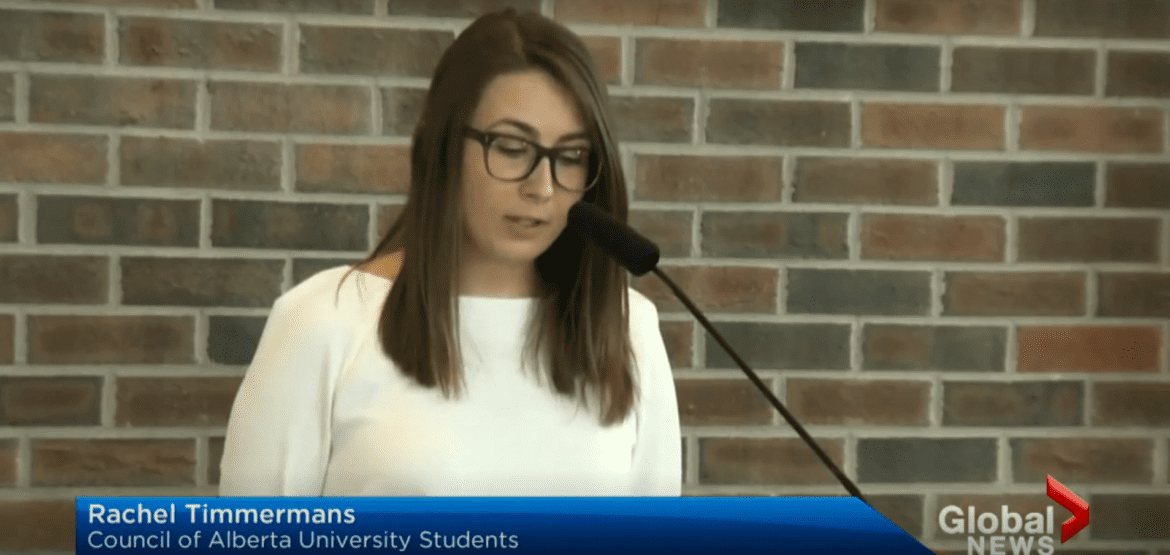
SAMRU’s Dating, Domestic, and Sexual Violence Advocacy Update
Your Students’ Association has found incredible success with its advocacy on dating, domestic, and sexual violence (DDSV) both towards MRU and the Alberta government. Continue reading to see how far we’ve come with this advocacy work and what more there is to do.
2018-2019 academic year
SAMRU started actively advocating to address DDSV issues in 2018 through our provincial advocacy organization, the Council of Alberta University Students (CAUS). That year, CAUS developed a draft of a report proposing recommendations for the Government of Alberta to consider. SAMRU REC Vice-President External Amanda LeBlanc was the Vice-Chair of CAUS that year, and her leadership in getting this project off the ground was instrumental.

That same year, at MRU, SAMRU REC Vice-President Student Affairs, Shayla Breen, initiated a SAMRU-led advisory committee comprised of students and MRU staff and faculty called the Dating, Domestic, and Sexual Violence Advisory Committee (DDSVAC). This committee was tasked with reviewing how MRU was currently addressing DDSV issues on campus and providing recommendations for how MRU could improve its approach.
2019-2020 academic year
Internally at MRU, the new REC Vice-President Student Affairs, Kainat Javed, began holding DDSVAC meetings and carrying out the work of the committee. This work was passed on to her successor, Camille Rhose Tabacla, for the 2020-21 academic year.

In the summer of 2019, Shayla Breen, now the SAMRU REC President and a CAUS member, resumed work on the CAUS DDSV report and did a major overhaul with the help of SAMRU staff. This redo turned the old draft from a report that provided general commentary on the existing state of DDSV in Alberta, to a comprehensive road map to adequately address DDSV issues on Alberta campuses. The report, titled “Sexual Violence on Campus: Recommendations for the Government of Alberta” (commonly known as the CAUS White Paper on campus sexual violence) was released in January 2020. The report’s release was shared with the government and saw good media coverage, such as these CBC and Herald articles. The response from the government was positive but non-committal.
2020-21 academic year
SAMRU’s delegates to CAUS for this year, REC President, Spirit River Striped Wolf, and Vice-President External, Rachel Timmermans, carried on advocating for the provincial government to make commitments to achieve the recommendations from the CAUS White Paper. However, the government remained non-committal.
Back at MRU, DDSVAC’s work wrapped up, and the final report and recommendations, titled “Transforming Mount Royal University’s Institutional Response to Dating, Domestic, and Sexual Violence on Campus” was released.
2021-2022 academic year

Three years after the CAUS DDSV report was conceived, SAMRU’s work finally made a meaningful impact on the province’s approach to how they address DDSV issues on post-secondary campuses. REC Vice-President External and Chair of CAUS, Rachel Timmermans, co-hosted a press conference in February 2022 with the Ministry of Advanced Education and the Ministry for the Status of Women to announce a new way forward. In their remarks, the government made multiple references to CAUS’ White Paper as the principle document they relied on to develop their strategy. The government’s approach fulfilled four out of five of the CAUS report’s recommendations (details here). In a satisfying turn of events, Amanda Leblanc—the original protagonist in the story of the CAUS White Paper and SAMRU REC Vice-President External for 2018-19—was in attendance for the press conference as the press secretary for the Associate Minister for the Status of Women.
The government’s announcement committed to a new province-wide survey to get a better understanding of the state of sexual violence and harassment in Alberta’s post-secondary communities (CAUS recommendation #1). In addition, post-secondary institutions will have until the end of 2022 to update their campus violence policy to reflect current best practices while ensuring they take a survivor-focused approach (CAUS recommendation #2). It also provided a new grant of $2.5 million to post-secondary institutions to support training and awareness programs on campuses (CAUS recommendations #3 and #5). Only recommendation #4 of the CAUS report was left unfulfilled, which called for funding to help post-secondaries expand their capacity to actively address dating, domestic, and sexual violence issues for their campus community. However, we are hopeful that as the new survey uncovers how large the problem truly is, we will see further funding.
In March 2022, MRU’s Executive Director of Student Affairs contacted the current SAMRU Vice-President Student Affairs, Joseph Nguyen, to request SAMRU’s participation in MRU’s new Gender-Based Violence Working Group. This group will be tasked to respond to SAMRU’s DDSVAC report and update MRU’s Sexual Violence Policy in accordance with the government’s direction.
What’s next: 2022-2023 academic year
Advocacy and change often take time, but SAMRU hopes that MRU students past and current feel pride in what their elected student representatives have accomplished on the topic of dating, domestic, and sexual violence over the years. The 2022-2023 year will be the best one yet as far as addressing DDSV issues is concerned.
Keep an ear out for big changes as SAMRU’s work starts to pay dividends. We promise to continue our advocacy to keep both MRU and the provincial government accountable so we can reach our vision of greatly reducing the risk of experiencing dating, domestic, or sexual violence on campus, and to have exceptional on-campus support for those that do.

